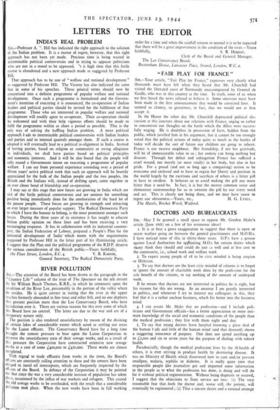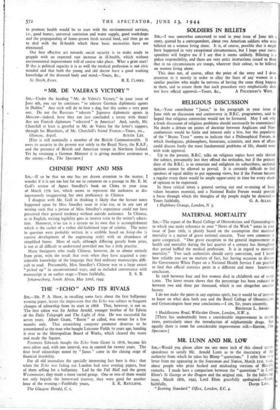DOCTORS AND BUREAUCRATS
Snt,—May I be granted a small space to oppose Mr. Gordon Males article (June tfith) on a few of his erroneous ideas?
i. It is at best a gross exaggeration to suggest that there is open or secret warfare going on between the general practitioners and M.O.H.s. I have noticed none of this in thirty-three years. G.P.s have a grouse against Local Authorities for apeointing M.O.s for certain duties which many think they should and could do just Ls well and at less cost to the community, i.e., school work and welfare work
2. To expect young people of s8 to be civic minded is being utopian or Hitlerian.
3. To say that doctors are the least civic minded of citizens is to forget or ignore the amount of charitable work done by the profession for the sole benefit of the citizens, to say nothing of the amount of underpaid work.
If he means that doctors are not interested in politics he is right, but his reasons for this are wrong. As an amateur I am greatly interested in politics, and whenever I try to interest my colleagues in this, they feel that it is a rather unclean business, which fits better into the business mind.
4. I can assure Mr. Malet that no profession—and I include poli- ticians and Government officials—has a better appreciation or more inti- mate knowledge of the social and economic conditions of the people than ' the medical profession ; they live with them night and day.
5. To say that young doctors leave hospital knowing a great deal of the human b xly and little of the human mind (and that diseased) shows a staggering innocence of purpose. One does not spend anything up to £2,000 and six or seven years for the purpose of dealing with robust health.
Paradoxically, though the medical profession lives by the ill-health of others, it is ever striving to produce health by destroying disease. It was no Ministry of Health which discovered how to cure and/or prevent smallpox, malaria, syphilis or diabetes. It is really quite time that responsible people like journalists got and imparted some information to the people as to what the profession has done, is doing and will do for it without political regimentation. Without being dogmatic or assured, I suggest that the objections to State service are two: (1) The very reasonable fear that .both the doctor and, worse still, the patient, will eventually be regimented ; (2) That a sincere desire and a rational attempt
to promote health would be to start with the environmental services, i.e., good homes, universal sanitation and water supply, good workshops and the propaganding of home-grown fresh natural food, and then go on to deal with the ill-health which these basic necessities have not eliminated.
Our first effective act towards social security is to make ready to grapple with an expected vast increase in ill-health, which without environmental improvement will of course take place. What a grim start! If this is political sagacity it is as well the medical profession is not civic minded and that both the young and old doctor have a good working knowledge of the diseased body and mind.—Yours, &c.,























 Previous page
Previous page